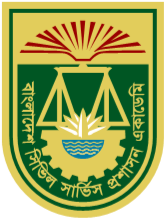The Role of Union Parishads in Attaining SDG 16.6 in Bangladesh: From Policy to Practice
Keywords:
Union Parishad , SDG 16.6, Decentralised governance, Capacity enhancementAbstract
This study examines the role of Union Parishads (UPs) in making Sustainable Development Goal 16.6 more relevant to local communities. It focuses on three main aspects of governance: how well they deliver services, hold people accountable, and how transparent they are about their decision-making. The study reveals moderate institutional progress but also highlights systemic problems. It used a mixed-methods approach that included household surveys, Key Informant Interviews (KIIs), and Focus Group Discussions (FGDs) in four Union Parishads in four northern districts of Bangladesh. The results show that UPs have made it easier for people to get basic services and use local infrastructure. However, weak accountability practices, financial transparency, elite capture, and gender-based exclusion limit their performance. People still mostly participate in statutory forums, such as Open Budget Meetings and Ward Shavas, for the show, and trust in local institutions is weak. The study demonstrates how informal norms and a lack of capacity often undermine formal mandates by combining Governance Theory, principal-agent theory, and New Institutionalism. The paper contributes to the body of work on decentralised governance and SDG localisation by providing data-driven ideas and policy suggestions for enhancing UP's capacity, inclusivity, and responsiveness at the local level.
Downloads
Published
Issue
Section
Categories
License
Copyright (c) 2025 Pranab Kumar Panday, PhD

This work is licensed under a Creative Commons Attribution 4.0 International License.


